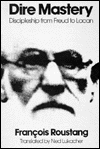

 |

|

The average rating for Dire mastery based on 2 reviews is 4.5 stars.
Review # 1 was written on 2020-05-06 00:00:00 Teena D Flook Teena D FlookAbsolutely superb, insightful, lyrical dissection of the phenomenon of the psychoanalytic guru. The one-star ratings are extremely revealing. |
Review # 2 was written on 2018-03-06 00:00:00 Sean Ramey Sean RameyFrançois Roustang was a member of the École freudienne de Paris, the psychoanalytic association founded by Jacques Lacan, from 1965 until its dissolution in 1981. Later in his career he broke with both Lacanism and psychoanalysis, as boldly announced in The Lacanian Delusion (1986), but the seeds of his dissatisfaction with this field are already evident in Dire Mastery (1976), his fourth book. Roustang is concerned with a problem that historically has haunted the structures of authority in psychoanalysis: the relationship between master and disciple. As such, he engages in a detailed analysis of several cases that are drawn from the life of Freud. Opening the book, for instance, is a detailed examination of the complicated relationship between Freud and Jung. In this scenario, Jung plays the part of the false disciple, the one that Freud desperately wants to adopt as his son, but who secretly has a mind and agenda of his own. Another crucial example is the case of Victor Tausk, whose ideas were apparently as brilliant and original as Freud's, but wanted to subordinate himself as a disciple to the "master." Freud nonetheless regarded Tausk as a potential rival and engineered the circumstances that led to the latter's suicide. Finally, there is an in-depth examination of Georg Groddeck, who did set himself up as a direct rival to Freud and, outmaneuvered by the master, eventually succumbed to paranoia and mental illness. Together, these three cases show the major permutations of the master-disciple relationship. As interesting as these case studies are, the really brilliant - and universally applicable - aspect of Dire Mastery comes in chapters 2 and 4. In these parts of the book, Roustang examines the problem of authority as it relates to the perpetuation of psychoanalytical discourse itself. Psychoanalysis, he points out, is grounded in the working through of transference. The function of the analyst is to help the patient to overcome the problems caused by the transference, to the point where analysis is no longer necessary. In this sense, the ultimate logic of psychoanalysis is one that points toward its own dissolution. The master relationship that Freud (and later Lacan) would set up with their disciples in order to continue the transmission of psychoanalysis as a discipline is thus implicitly at odds with their own logic. For the master-disciple relationship is one that is designed precisely to prolong the transference, to instill a love for the master and his ideas. What I find particularly brilliant about this analysis is that it makes psychoanalysis serve as a poignant meta-language for subversive politics. Freud and Lacan are clearly revolutionaries who understand how to deal with the transference, but where they fail, in practice, is to deal with the counter-transference that, like Actaeon's hounds, turns on them. Roustang's book is not for everyone, especially as it requires a degree of theoretical knowledge and some familiarity with the history of psychoanalysis. The historical examples he uses provide varying degrees of interest - Jung's case is interesting simply because it is so famous, Tausk's because of its air of professional scandal, but the extended examination of Groddeck is informative but less compelling. There is also a final chapter on psychosis that Roustang insists relates to the larger book, but I was unconvinced of its value here. Overall, Roustang's examination of the master-disciple dynamic is rich in examples of the pitfalls of authority, and effectively shows how psychoanalysis, when it is freed from such problems, can be a powerful tool for the liberation of the subject. |
CAN'T FIND WHAT YOU'RE LOOKING FOR? CLICK HERE!!!